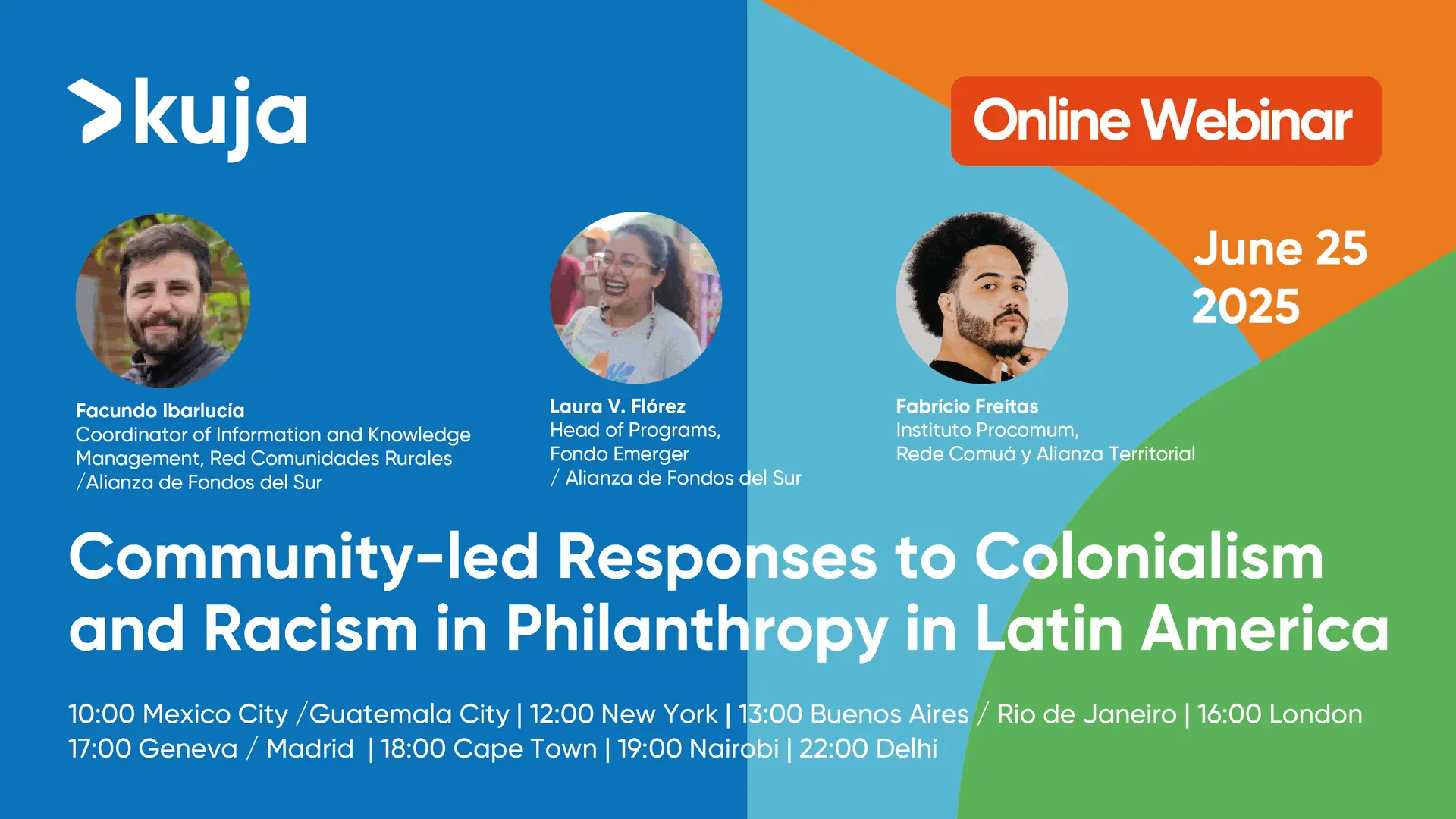Across Latin America, thousands of grassroots, Indigenous, and rural organizations continue to be excluded from international funding due to deep-seated racism, colonialism, and structural inequalities. In a recent webinar organized by Kuja Platform, an initiative of Adeso, representatives of philanthropy networks gathered to discuss how they are actively challenging these barriers by creating more just, participatory, and community-driven philanthropic models.
Rethinking Philanthropy: From Exclusion to Empowerment
Structural Racism and Colonial Legacies in Philanthropy
Facundo Ibarlucía of Red Comunidades Rurales (Argentina) highlighted the stark inequalities in funding access. Despite Indigenous Peoples protecting 80% of the planet’s remaining biodiversity, they receive less than 1% of international climate funding. Rural and Indigenous communities face additional barriers like geographic isolation, limited internet access, and a lack of statistical data, further marginalizing them from traditional philanthropy.
In response, Red Comunidades Rurales launched the Banco de Proyectos Comunitarios Rurales (Rural Community Projects Bank), an initiative designed to decentralize decision-making and ensure community voices lead funding priorities. Through participatory governance, these communities collaboratively design and implement socio-environmental projects tailored to their specific regional needs, breaking free from the dependence on large, urban intermediaries.
Reviving Traditional Practices of Mutual Aid
Laura Flórez from Fondo Emerger (Colombia) emphasized that many of the so-called "innovations" in philanthropy are, in fact, ancestral practices rooted in community life—long predating the formal concept of philanthropy. In the Global South, solidarity, mutual aid, and trust-based relationships are intrinsic to community survival.
Fondo Emerger supports community-led projects by providing flexible, rapid grants; typically around $5,000 per project, without imposing rigid conditions or external agendas. Communities decide how to allocate funds according to their needs, reaffirming their autonomy and reversing the paternalistic dynamics often imposed by donors.
One of their most successful models is community savings groups self-managed financial collectives that provide affordable credit and foster community solidarity. Beyond financial security, these groups empower communities to pursue local priorities, from education to climate resilience, demonstrating that financial sovereignty is deeply intertwined with collective strength.
Philanthropy Rooted in Territory and Trust
Fabricio Freitas of Instituto Procomum (Brazil) presented the Aliança Territorial, a coalition of seven organizations across Brazil committed to territorial-based philanthropy. Their approach centers on the belief that communities themselves hold the knowledge and solutions needed for local transformation.
Working in both rural and urban territories, the alliance provides not only funding but also technical support, political advocacy, and institutional strengthening. They focus on long-term strategies that address structural inequalities through collective decision-making and participatory processes.
Among their initiatives are emergency response funds that evolve into long-term community development plans, participatory labs that foster local innovation, and policy advocacy campaigns led by grassroots organizations.
Towards Decolonized Philanthropy: Key Takeaways
Throughout the conversation, all speakers agreed on several key principles necessary to transform philanthropy:
-
Shift Power to Communities:
Communities must lead decision-making processes, not just be recipients of aid. Funding models must be co-designed with grassroots organizations. -
Recognize and Respect Local Knowledge:
Traditional practices of mutual aid, barter, and collective labor are valuable tools for resilience and should be honored, not dismissed. -
Trust Over Control:
Grantmaking should be flexible, allowing communities to define their priorities without paternalistic conditions. -
Language Matters:
Terms like “philanthropy” often feel alien or colonial to communities. Many prefer terms like solidarity, mutual aid, or collective care that resonate with their lived experiences. -
Work Beyond Projects—Strengthen Relationships:
Philanthropy should foster long-term relationships rooted in trust and shared learning, not just short-term transactions. -
Listen First, Act Later:
Donors and Global North institutions should listen deeply before acting, recognizing that solutions are already alive in communities.
Resources to Explore More:
- Facundo Ibarlucía's Presentation (Red Comunidades Rurales & Banco de Proyectos Comunitarios Rurales, Argentina)
- Fondo Emerger (Colombia)
- The Trust Gap Report (Human Rights Funders Network)
- Community Savings Groups Report (Fundación Semillas, Colombia)
- Video on Aliança Territorial (Brazil)
- Event Page: Community Responses to Colonialism and Racism in Latin American Philanthropy (Kuja)
Watch the full webinar recording here.
